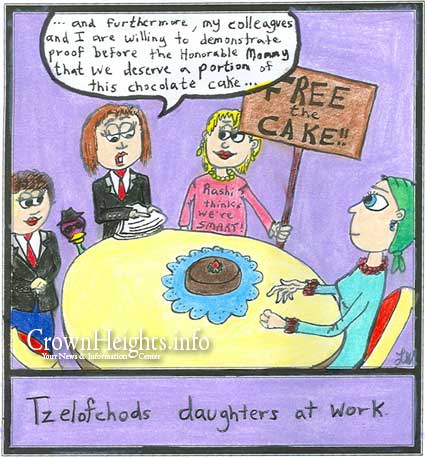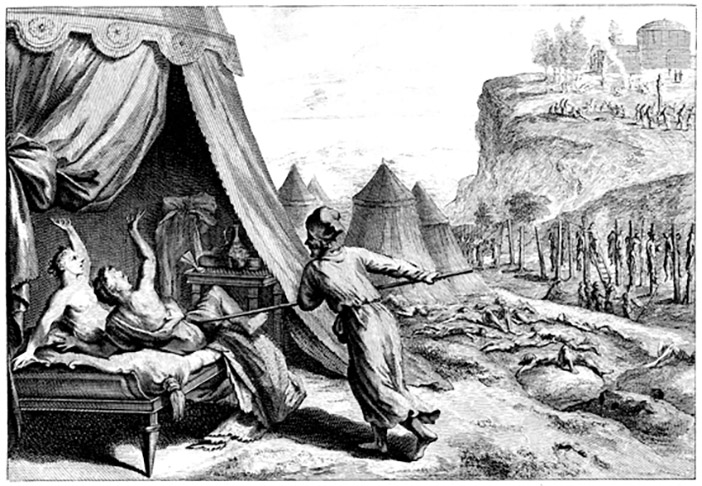Bonjour / Hello [nickname_else_first_name],
Table of contents
1) Perashat Hashavoua - Rabbi Eli Mansour
2) Halakhat Hashavoua (Halakhot related to day to day life) - Hazzan David Azerad
- Sleeping on Shabbat
3) Holy Jokes!
4) FOR KIDS!

This Week's Parasha Insight with Rabbi Eli Mansour
Parashat Pinhas: The Covenant of Peace
In the beginning of Parashat Pinhas, G-d speaks to Moshe and announces that He would be rewarding Pinhas for his bold action during the tragic event of Ba’al Pe’or. As we read in the final verses of Parashat Balak, Beneh Yisrael engaged in illicit relationships with the women of Moab, and worshipped Moab’s deity, in response to which G-d sent a deadly plague that killed many thousands among Beneh Yisrael. Pinhas ended the plague by killing Zimri – a leader of one of the tribes of Beneh Yisrael – as he committed a public sinful act with a woman from Midyan. G-d announced that He would be rewarding Pinhas, granting him "Beriti Shalom" – "My covenant of peace."
The Or Ha’hayim Ha’kadosh (Rav Haim Ben-Attar, 1696-1743) explains this verse amidst his discussion in Sefer Debarim of the Ir Ha’nidahat – the extraordinary law requiring killing all the inhabitants of a city that embraced idol worship. The Torah promises Beneh Yisrael that if they fulfill this command, and eliminate the people of such a city, then G-d "will grant your compassion, and have compassion on you" (Debarim 13:18). The Or Ha’hayim explains that G-d promises not only to treat the nation compassionately, but also that He would "grant you compassion" – ensure that the act of killing a city’s population would not engender a violent character. Normally, people who begin acting violently develop a violent nature. G-d assures Beneh Yisrael that when they are compelled to eliminate a city that worships idols (something which, incidentally, the Gemara tells never actually happened), He would see to it that this will not affect their compassionate personalities, and they will remain kind, loving and merciful people even after going through this experience.
The Or Ha’hayim explains G-d’s promise to Pinchas along similar lines. Although Pinhas committed an act of murder, he was guaranteed that this would not have an impact on his character. G-d granted Pinhas His "covenant of peace" – His guarantee that he would remain a peaceful, kind person despite having killed two people for the sake of G-d’s honor.
This insight teaches us that every action we perform impacts upon our character. Every slight inappropriate act makes us more likely to then commit another inappropriate act. If we are careful to perform all our actions sincerely for the sake of G-d, following His instructions and striving to fulfill His will, then we are guaranteed His "covenant of peace," that our actions will refine and elevate our characters, such that we continue to grow each day of our lives

Halakhot selected and translated by Hazzan David Azerad
Sleeping On Shabbat ( Peninei Halacha )
Included in the mitzvah of oneg Shabbat is sleeping soundly, as the popular proverb has it: “Sleeping on Shabbat is a pleasure.” But it is not proper for one to sleep on Shabbat in order to work Saturday night. Doing this subordinates Shabbat to the weekday. One should not even sleep on Shabbat in order to study Torah Saturday night, because by doing so he loses precious, holy time on Shabbat, during which Torah study is weightier than learning done during the week (Ben Ish Ĥai, Year 2, Introduction to Shemot, states, based on kabbalistic interpretations, that Torah study on Shabbat is a thousand times more powerful than Torah study during the week ).
Similarly, it is not proper for one to work extra hours on Thursday and Friday and plan to make up for his lost sleep on Shabbat. On the contrary, it is a mitzvah to spend the weekdays preparing for Shabbat. One should prepare food for Shabbat, clean the house, do the laundry, and bathe. Certainly included in Shabbat preparation is making the effort to begin Shabbat in a well-rested state rather than an exhausted one. This allows one to focus on study and prayer and to properly enjoy the Shabbat meals. Only if one worked extra hours on Thursday and Friday due to factors out of his control that left him no other choice may he catch up on sleep over Shabbat, but one may not plan things that way. The saying: “Sleep on Shabbat is a pleasure” means that if one generally sleeps seven hours a night, he should sleep for eight hours on Shabbat, so he will be better rested and refreshed. But it does not mean that Shabbat should, God forbid, become the weekdays’ servant, by serving as a time when people can make up for sleep missed during the week.
In terms of afternoon naps , there are various customs. Rambam (MT 30:10) records that pious people would wake up early on Shabbat morning, pray Shaĥarit and Musaf, return home for the second meal, study in the beit midrash until late afternoon, pray Minĥa, and eat seudah shlishit until the end of Shabbat. However, some poskim write that one who is accustomed to sleep in the afternoon does not have to skip his nap, because sleep is included in oneg Shabbat (Tur §290). Of course, one must be careful that he does not sleep so much that he is unable to dedicate time to study. For we have already learned that on Shabbat at least six hours must be dedicated to Torah study. So, if one sleeps longer on Shabbat afternoon, he must learn more Torah on Friday night after the Shabbat meal or earlier on Shabbat morning.
One must be careful not to eat too much at the meals, because overeating makes people very sleepy and is not truly pleasurable. Though one enjoys the taste of the food while eating, afterward one feels heavy, exhausted, and often also depressed, because all the body’s resources must be mobilized to digest the excessive quantity of food. After eating like this one has no energy to focus on studying or on having deep, beautiful conversations with family members. Therefore one must be very careful not to overeat, so the meal and its delicacies add energy and liveliness to one’s Torah study. One who nevertheless becomes tired after eating should sleep for a bit and then arise energetically to study Torah.
Bevirkat Shabbat Shalom Umevorach
David Azerad
3) HOLY JoKeS!!
Selection of funny snippets, loosely related to this weeks parashah or current events, to brighten your day
#NOBACKSIES



Click on the image to open the youtube video
















